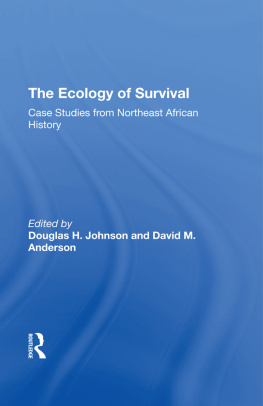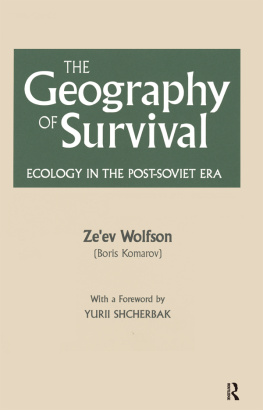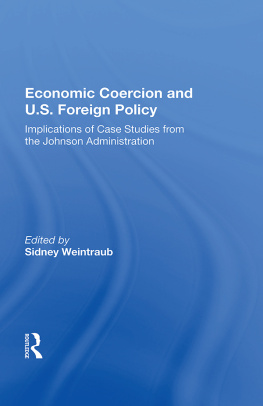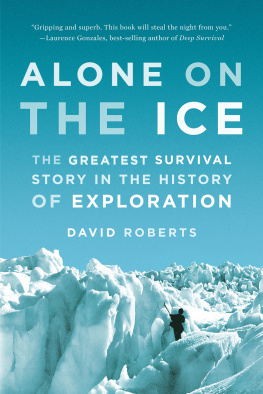First published 1988 by Westview Press
Published 2019 by Routledge
52 Vanderbilt Avenue, New York, NY 10017
2 Park Square, Milton Park, Abingdon, Oxon OX14 4RN
Routledge is an imprint of the Taylor & Francis Group, an informa business
Copyright in London, England by Lester Crook Academic Publishing 1988
All rights reserved. No part of this book may be reprinted or reproduced or utilised in any form or by any electronic, mechanical, or other means, now known or hereafter invented, including photocopying and recording, or in any information storage or retrieval system, without permission in writing from the publishers.
Notice:
Product or corporate names may be trademarks or registered trademarks, and are used only for identification and explanation without intent to infringe.
British Library Cataloguing in Publication Data
The Ecology of survival : case studies
from North African history.
1. Africa. North-east Africa. Rural communities. Survival, to 1987.
Ecological aspects
I. Johnson, Douglas, H., 1949-
II. Anderson, David M. (David McBeath), 1957-
307.7 2 0961
ISBN 13: 978-0-367-29149-5 (hbk)
Contents
David M. Anderson and Douglas H. Johnson
John A. J. Gowlett
Richard Pankhurst and Douglas H. Johnson
Richard Waller
Mustafa Babiker Ahmed
Ladislav Holy
Leif O. Manger
Douglas H. Johnson
Beverley Gartrell
Neal W. Sobania
David M. Anderson
David Turton
James McCann
Guide
DAVID M. ANDERSON: Lecturer in History at Birkbeck College, University of London; co-editor of the Journal of African History , and coeditor with R. Grove of Conservation in Africa: People, Policies and Practice (1987).
BEVERLEY GARTRELL: Assistant Professor, Department of Sociology and Anthropology, Simon Fraser University, British Columbia, Canada; author of several articles on the colonial history and anthropology of Uganda and East Africa.
JOHN GOWLETT: Formerly at the Department of Archaeology, University of Khartoum, and the Oxford University Research Laboratory for Archaeology and the History of Art; now Deputy Director, Institute of Prehistoric Sciences and Archaeology, University of Liverpool; author of Ascent to Civilisation (1984).
LADISLAV HOLY: Professor of Social Anthropology, University of St Andrews; author of Neighbours and Kinsmen. A Study of the Berti People of Darfur (1974).
DOUGLAS H. JOHNSON: Formerly Assistant Director for Archives in the Regional Ministry of Culture and Information, Juba, the Sudan; author of several articles on Sudanese history.
LEIF O. MANGER: Research Fellow at the Center for Development Studies, University of Bergen, Norway; development consultant; author of The Sand Swallows Our Land: Over-exploitation of Productive Resources and the Problem of Household Viability in the Kheiran a Sudanese Oasis (1981).
JAMES McCANN: Assistant Director, African Studies Center and Assistant Professor of History, Boston University; consultant to Oxfam America; author of From Poverty to Famine in Northeast Ethiopia: A Rural History, 190035 (1987).
MUSTAFA BABIKER AHMED: Research Student, Department of Sociology and Social Anthropology, University of Hull.
RICHARD PANKHURST: Formerly Director of the Institute of Ethiopian Studies (Addis Abeba); Librarian of the Royal Asiatic Society; author of Economic History of Ethiopia (1968), The History of Famine and Epidemics in Ethiopia Prior to the Twentieth Century (1985), and numerous other publications on Ethiopian history.
NEAL W. SOBANIA: Associate Professor of History at Hope College, Michigan; author of the UNESCO report A Background History to the Mount Kulal Region of Northern Kenya (1979), and the forthcoming book, Men, Milk and Millet.
DAVID TURTON: Senior Lecturer in Social Anthropology at the University of Manchester; member of Oxfam Field Committee for Africa; author of several articles on the Mursi of southwestern Ethiopia.
RICHARD WALLER: Senior Lecturer in History at Chancellor College, University of Malawi; author of several articles on the history of the Maasai and on East African pastoralism.
This book is the product of two meetings held in Oxford in 1985 and 1986. The first was a one-day public conference, sponsored and largely financed by the Oxford University Inter-Faculty Committee for African Studies, which met at Wolfson College on 8 July 1985 to discuss the topic of The human factor in ecological change in northeast Africa: case studies from the 19th and 20th centuries. The meeting was exploratory in nature, drawing on the work of persons then in Britain. A number of participants were sufficiently encouraged by the outcome of the conference to arrange a follow-up workshop, emphasising the case studies and drawing on a wider range of expertise, with the intention of producing a coherent volume. This workshop was organised independently and met at the Institute of Social Anthropology on 78 July 1986.
The twin purposes of these meetings, and of this book, were to place some of northeast Africas current ecological problems into historical perspective; and to demonstrate the value of extended field-work in producing such a perspective. All of the contributors to this volume have had extensive experience living in the countries about which they write. Most have been able to visit their areas of study over a period of several years; thus observing longer term changes than would be possible if confined to the traditional agricultural year of orthodox field-work, or the minimum rapid field-study of modern development projects. In the crisis atmosphere generated over northeast Africa during the catastrophic droughts and famines of 19846 a sense of extreme urgency now pervades much writing on Africas environmental crisis. The urgency is warranted, but any solutions to Africas ecological problems must be based on a thorough understanding of both the broader historical patterns of ecological change, and local interactions between man, society and the environment. This understanding can come about only after sustained research, placing field studies in wider national or regional contexts. All of us in this volume have tried to keep these perspectives in mind when presenting our case studies. We offer them now, not as the definitive word on our areas, nor as proven models for others to imitate, but as a prelude to further work; both our own, and we hope, that of others.
There have been other works dealing with aspects of history and ecology in specific countries in Africa, but this is the first volume which attempts to make broad comparisons between a number of areas within northeast Africa. As such it helps to bridge the gap which has so often separated scholars working in the Sudan, Ethiopia and East Africa from each other. The papers in this collection will be of use to specialists who wish to continue research on ecological change in various parts of northeast Africa. More than that, however, they will be of value to non-specialists who need a comprehensible introduction to the complexities of society and ecology in the region.
It is worth emphasising that this volume it intended to be a coherent set of contributions, each addressing in its own way a series of closely related issues; it is not the standard, miscellaneous proceedings of a broad-ranging conference. This has been a collective effort and, in so far as it has been successful, it owes much to the discussions enerated at the meetings of 1985 and 1986. Those who attended both meetings are David Anderson, John Gowlett, Ladislav Holy, Mustafa Babiker Ahmed, Richard Pankhurst and Douglas Johnson. We benefited greatly from papers, not included here, presented by Paul Baxter, Tony Barnett, David Gibbon and Paul Spencer. We also owe a debt of gratitude to Gerhard Baumann and John Galaty for chairing discussions. In the 1986 workshop we were glad to include James McCann, Leif Manger, Neal Sobania and Richard Waller. Both David Turton (who attended the 1985 conference but could not come to the 1986 workshop) and Beverley Gartrell were able to send papers for inclusion in the final volume.









